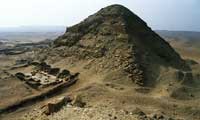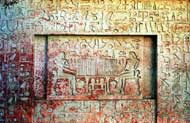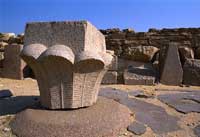|
Abu Sir
 Sometime
during the Fifth Dynasty a northern extension was made to the
Saqqara necropolis in the area called Abu Sir. Up until then,
Abu Sir was not an oft-used royal burial site, though the tomb
of the Third Dynasty King Sekhemkhet was unearthed there in the
1950s. Sometime
during the Fifth Dynasty a northern extension was made to the
Saqqara necropolis in the area called Abu Sir. Up until then,
Abu Sir was not an oft-used royal burial site, though the tomb
of the Third Dynasty King Sekhemkhet was unearthed there in the
1950s.
Userkaf, the first pharaoh of the Fifth Dynasty, built his
pyramid at Saqqara, but four of his successors had their tombs
at Abu Sir. Yet Userkaf had built at Abu Sir before, not a tomb,
but a temple. King Userkaf's Temple of the Sun is the earliest
preserved Sun Temple in Egypt. It is the northernmost monument
at Abu Sir. Userkaf ruled for only seven years, and thus was
unable to complete the construction, though additions were made
by his successors. Its design is simple and lacks of relief
decoration .
 It is suggested that the Sun Temple was connected with the
worship of the goddess Neith (the "Opener-of-the-Ways") whose
cult became popular in the Memphis area during the Fifth
Dynasty. It is suggested that the Sun Temple was connected with the
worship of the goddess Neith (the "Opener-of-the-Ways") whose
cult became popular in the Memphis area during the Fifth
Dynasty.
The prime building material of the pyramid complex at Abu Sir
was the local limestone, but Tura limestone (from the east bank
of the Nile) was used for casing stones and for relief work.
Additionally, the pathways and pavements were made of black
basalt, and the columns and lintels were made of red granite
from Aswan.
 Nearby are the mastabas, the flat tombs of priests, nobles, and
prominent citizens.. Though Abu Sir was used only occasionally
to bury pharaohs, the wide range of dates for the mastabas
indicate that it was a very popular burial site among certain
classes, especially the priesthood. Nearby are the mastabas, the flat tombs of priests, nobles, and
prominent citizens.. Though Abu Sir was used only occasionally
to bury pharaohs, the wide range of dates for the mastabas
indicate that it was a very popular burial site among certain
classes, especially the priesthood.
In all, around fourteen pyramids are estimated to be at Abu Sir,
but due to a degradation in construction methods, many have
crumbled, possibly to the point where they are now
indistinguishable from the surrounding rubble. Many remain
unfound, but four have been excavated and are being studied
closely. Of these four, only the pyramids of Kings Sahure and
Neferirkare (pyramid) are in any stable condition. The pyramid
of Niuserre has largely collapsed, and that of Neferefre does
not appear ever to have been finished. Neferefre's pyramid is
not completely without merit, however. Recently, a Czech
expedition working to excavate and restore Abu Sir found papyrus
fragments in its mortuary temple. |